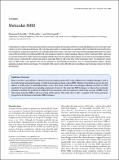Molecular fMRI
Author(s)
Barandov, Ali; Jasanoff, Alan Pradip; Bartelle, Benjamin B.
DownloadBartelle-2016-Molecular fMRI.pdf (637.1Kb)
PUBLISHER_CC
Publisher with Creative Commons License
Creative Commons Attribution
Terms of use
Metadata
Show full item recordAbstract
Comprehensive analysis of brain function depends on understanding the dynamics of diverse neural signaling processes over large tissue volumes in intact animals and humans. Most existing approaches to measuring brain signaling suffer from limited tissue penetration, poor resolution, or lack of specificity for well-defined neural events. Here we discuss a new brain activity mapping method that overcomes some of these problems by combining MRI with contrast agents sensitive to neural signaling. The goal of this “molecular fMRI” approach is to permit noninvasive whole-brain neuroimaging with specificity and resolution approaching current optical neuroimaging methods. In this article, we describe the context and need for molecular fMRI as well as the state of the technology today. We explain how major types of MRI probes work and how they can be sensitized to neurobiological processes, such as neurotransmitter release, calcium signaling, and gene expression changes. We comment both on past work in the field and on challenges and promising avenues for future development.
Date issued
2016-04Department
Massachusetts Institute of Technology. Department of Biological Engineering; Massachusetts Institute of Technology. Department of Brain and Cognitive Sciences; Massachusetts Institute of Technology. Department of Nuclear Science and EngineeringJournal
Journal of Neuroscience
Publisher
Society for Neuroscience
Citation
Bartelle, B. B., A. Barandov, and A. Jasanoff. “Molecular fMRI.” Journal of Neuroscience 36.15 (2016): 4139–4148.
Version: Final published version
ISSN
0270-6474
1529-2401